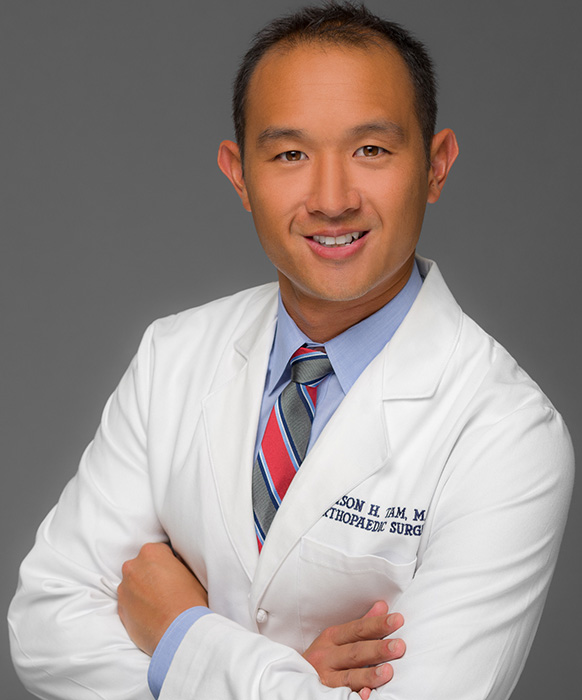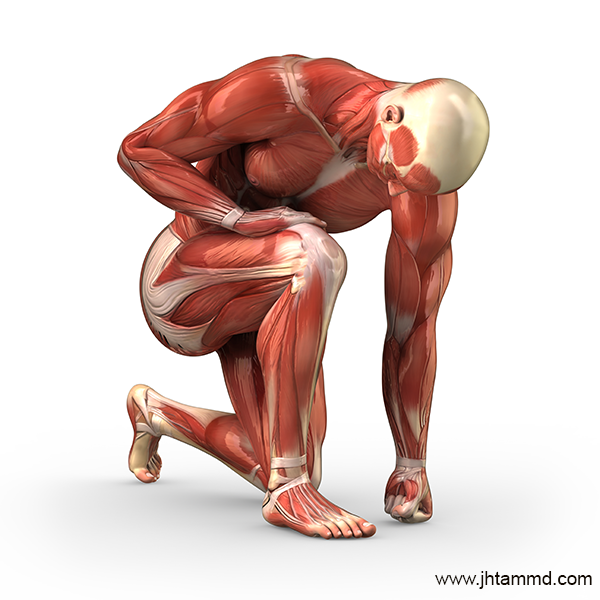Clinical Interest
- Treatment, repair, and reconstruction of shoulder, elbow, knee, and ankle tendon, ligament, cartilage, or bone conditions (acute or chronic; arthroscopic or open)
- Management of shoulder arthritis (arthroscopic shoulder debridement, partial shoulder arthroplasty, total shoulder arthroplasty, reverse shoulder arthroplasty, revision shoulder arthroplasty)
- Management of knee arthritis (arthroscopic knee debridement, partial knee arthroplasty, total knee arthroplasty)
- Treatment of adult and pediatric fractures of the upper and lower extremity
Doctor Tam is committed to excellence by pledging to provide the highest quality of orthopaedic care possible. Along with the treatment of immediate or chronic problems, we strive to integrate the doctrine of prevention in all our treatment plans as a way to alleviate possible future difficulties.
Commonly Treated Injuries:
- Meniscal Injuries
- Torn Ligaments
- Tennis/Golfer’s Elbow
- Rotator Cuff Tears
- Muscle Strains
- Shoulder Dislocation
- Cartilage Defects
- Osteoarthritis
- Overuse Injuries
- Impingement
- Upper & Lower Extremity Fractures
We are pleased to have you as a patient. If you have any questions, always feel free to contact our office and our trained staff will assist you in any way possible.

Sports Medicine
Focusing on helping patients improve their performance, recover from their injuries and restore their quality of life.
Arthroscopic Surgery
Advancements in minimally invasive surgery are changing how injuries are treated.“Every mountain top is within reach if you just keep climbing.”
— Richard James Molloy
What is a Sports Medicine Specialist?

A sports medicine specialist is a physician with significant specialized training in both the treatment and prevention of illness and injury. Orthopaedic sports medicine further adds expertise to this by utilizing both surgical as well as non-operative treatment modalities to address musculoskeletal conditions. The main goals of an orthopaedic sports medicine specialist are to restore quality of life, help to maximize function, and to minimize disability and time away from sports, work, or school.
Common examples of musculoskeletal problems include:
- Acute injuries (such as ankle sprains, muscle sprains, knee & shoulder injuries, and fractures)
- Overuse injuries (such as rotator cuff and other forms of tendonitis, stress fractures)
- Non-operative and surgical treatment options for osteoarthritis
Do Orthopaedic Sports Medicine Specialist only treat competitive athletes?
No, Sports Medicine Specialists are ideal physicians for the non-athlete as well, and are excellent resources for the individual who wishes to become active or begin an exercise program. For the “weekend warrior” or “industrial athlete” who experiences an injury, the same expertise used for the competitive athlete can be applied to return the individual as quickly as possible to full function.
What is Arthroscopy?
Arthroscopy is an advanced surgical procedure used to treat orthopaedic conditions which offers less risk and remarkable results for patients. This procedure is also known as arthroscopic surgery.
Surgeons perform this minimally invasive surgical procedure to correct orthopaedic joint trauma/conditions by inserting an arthroscope into a small incision in the compromised area. The arthroscope allows the surgeon to see and treat the patient through the incisions, providing a quick recovery and less post-operative pain than with open surgery. In nearly all cases, patients are able to return home the same day as their procedure is performed.
Conditions treated with arthroscopy include:
- Bone spurs
- Damaged/torn cartilage
- Inflamed/infected joints
- Loose bone fragments
- Torn ligaments and tendons
- Scarring or tissue overgrowth within joints


